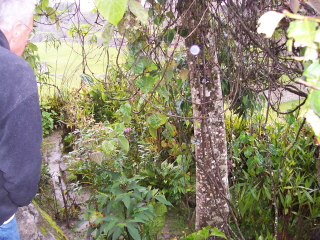Yesterday, I visited the world class Inca ruins at Machu Picchu. Despite it being a cloudy, foggy, rainy day (it is that season, after all), it was a very impressive experience, one I cannot recommend too highly. Located atop a mountain peak several thousand feet above the raging Rio Urubamba (to enter its waters at this time of year is certain death), Machu Picchu was the primary center for scientific and philosophical research for the Inca empire and a place of retreat for the Inca nobility. Its stonework is amazingly well-hewn, and the complex is huge. About a thousand people lived there full-time, with others coming for special occasions along the Inca trail from Cusco, the capital of the empire. If you ever get to Peru, seeing Machu Picchu is an absolute must. Iâm sure I havenât done it justice with these brief comments.
I benefited from traveling with a small group that had a very well-informed tour guide, and it was from him that I learned that coca was part of the Inca diet. In addition to using it for its hunger-suppressing and energy-providing qualities, the Incas used it to keep their teeth strong! The coca leaf is heavy in calcium, and because the Inca lacked cows and llamas provided only enough milk for their young, the coca leaf was their primary source of calcium. Our guide was quite proud of the fact that Inca skeletons always showed strong, healthy teeth, a fact he attributed to chewing the coca leaf.
Among the ruins at Machu Picchu, there is a garden packed with plants used by the Inca. Among them is coca, even though it is ill-suited to grow well at such elevations. In fact, the coca plant in the garden there was stunted and scraggly, growing only about 18 inches high, or about one-half to one-fourth of the size obtained by coca plants at elevations to which it is more suited. Still, they grew it at Machu Picchu, for the reasons mentioned above.
Today, Iâm trying to catch up on emails and news and all that good stuff before heading for Bolivia tomorrow. One thing I will do today, though, is visit the Buen Pastor shop, that place I mentioned a blog post or two ago, where they sell coca products here in Cusco. Look for something about that later today or Wednesday, since tomorrow will be a long day of bus travel across the 12,000-foot altiplano past Lake Titicaca and up to La Paz. I think I will be heading on to Cochabamba the next day, where my friends from the Andean Information Network await me.
The coca leaf is ubiquitous around here. My hotel provides some with breakfast every day. All the restaurants offer mate de coca (coca tea). Little indigenous women near Machu Picchu offer it to travelers getting ready to trek around the heights. And the US government wants to eradicate it all.
Now, I'm off to visit the coca shops of Cusco. Stay tuned.
Note: Dave Borden will be posting some Machu Picchu photos I sent him later today. Come back and check 'em out!
 stunted coca plant in garden, Machu Picchu
(click this post's title link or the "read full post" link for more pictures -- not coca or drug policy, but breathtaking)
stunted coca plant in garden, Machu Picchu
(click this post's title link or the "read full post" link for more pictures -- not coca or drug policy, but breathtaking)